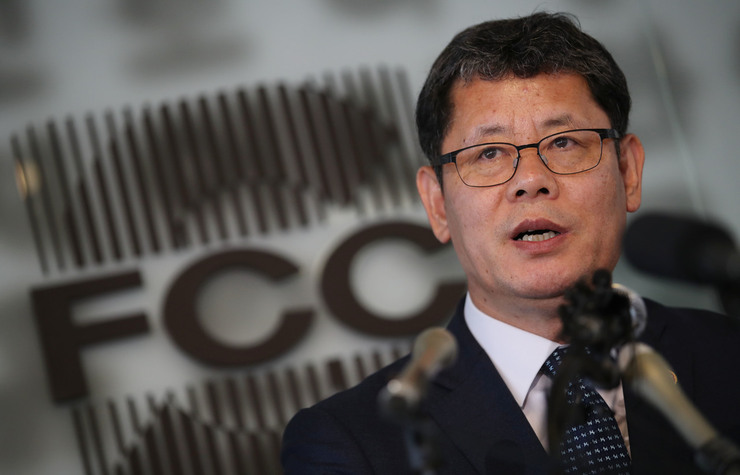 |
|
South Korean Unification Minister Kim Yeon-chul speaks to international reporters at the Seoul Foreign Correspondents’ Club (SFCC) roundtable on June 4. (Yonhap News)
|
Kim Yeon-chul speaks at Seoul Foreign Correspondents’ Club roundtable
Minister of Unification Kim Yeon-chul said on June 4 that “the most important thing in negotiations is trust, rather than just technical solutions to issues,” adding that it was “time for the US and North Korea to consider what they can do to restore their weakened trust.” Speaking at an invitational roundtable by the Seoul Foreign Correspondents’ Club (SFCC) at the Press Center in Seoul’s Jung (Central) district that day, Kim said, “The most important thing at the present time is for the North Korea-US negotiations to resume as quickly as possible.” Referring to denuclearization and the Korean Peninsula peace process, Kim noted the emerging support in South Korea and the US for a “comprehensive agreement with step-by-step implementation,” as well as growing support for a “simultaneously, parallel resolution rather than ‘denuclearization before anything else.’” His remarks suggested a change in stance from Washington, which effectively pursued the “denuclearization first” approach at its second summit with North Korea in Hanoi last February. Kim went on to raise the possibility of a “one-point” inter-Korean summit to resolve the current stalemate. “We have experience with inter-Korean summits taking place quite quickly as needed [as with a summit at Panmunjom’s Tongilgak building on May 26 of last year], and there are various environmental factors suggesting that could be possible now too,” he said. In connection with the recent issue of African swine flu, Kim noted, “There has been a large difference in the number of malaria cases in the border region when we have and have not sent malaria prevention medications to North Korea.” “Comprehensive cooperation on disease prevention is in both South and North Korea’s interest,” he stressed. Kim went on to observe that “fishing times have been increasing and fishing grounds broadening in the West [Yellow] Sea since April.” “A sea of conflict has been transforming into a sea of shared prosperity,” he said. When asked how a “peace economy” could be achieved amid sanctions, Kim noted, “There are collaborative projects in the humanitarian realm that can be carried out irrespective of sanctions.” “There are quite a few cooperative humanitarian efforts, including divided family reunions, humanitarian aid, and the exhumation of remains in the DMZ,” he explained. Meanwhile, President Moon Jae-in nominated Kim Chang-su on June 4 as secretary for unification policy in the Blue House National Security Office. Kim, 55, is currently secretary-general of the Ministry of Unification’s inter-Korean joint liaison office. By Noh Ji-won, staff reporter, and Lee Je-hun, senior staff writer Please direct comments or questions to [english@hani.co.kr]






